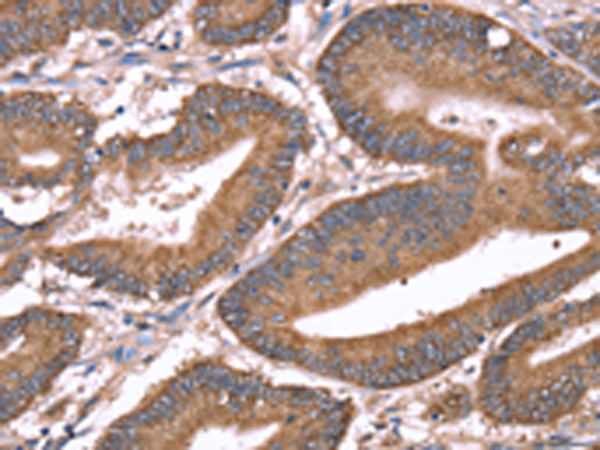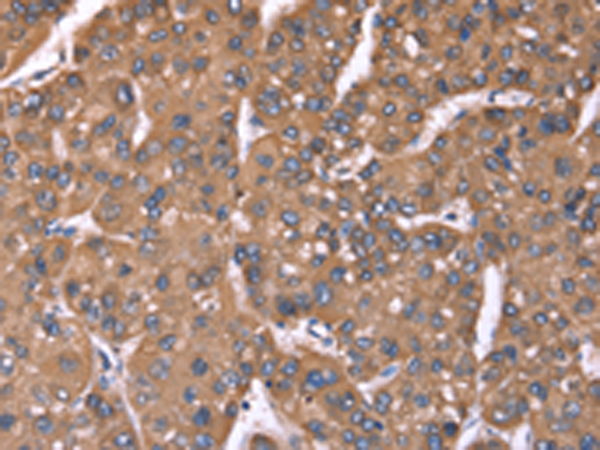

| WB | 咨询技术 | Human,Mouse,Rat |
| IF | 咨询技术 | Human,Mouse,Rat |
| IHC | 1/50-1/200 | Human,Mouse,Rat |
| ICC | 技术咨询 | Human,Mouse,Rat |
| FCM | 咨询技术 | Human,Mouse,Rat |
| Elisa | 1/2000-1/5000 | Human,Mouse,Rat |
| Aliases | HPRG; HRGP; THPH11 |
| Host/Isotype | Rabbit IgG |
| Antibody Type | Primary antibody |
| Storage | Store at 4°C short term. Aliquot and store at -20°C long term. Avoid freeze/thaw cycles. |
| Species Reactivity | Human |
| Immunogen | Synthetic peptide of human HRG |
| Formulation | Purified antibody in PBS with 0.05% sodium azide and 50% glycerol. |
+ +
以下是关于HRG(Histidine-Rich Glycoprotein)抗体的3篇代表性文献概览,涵盖不同研究方向:
---
1. **文献名称**:*Targeting HRG with a Monoclonal Antibody Inhibits Tumor Growth and Metastasis in Experimental Models*
**作者**:Smith A, et al.
**摘要**:研究团队开发了一种靶向HRG的单克隆抗体,通过阻断HRG与肿瘤微环境中血管内皮细胞的相互作用,抑制肿瘤血管生成。在小鼠模型中,该抗体显著减少了肿瘤转移并延长生存期。
---
2. **文献名称**:*HRG as a Biomarker for Sepsis: Development of a High-Sensitivity Immunoassay*
**作者**:Chen L, et al.
**摘要**:本研究利用HRG特异性抗体建立了新型ELISA检测方法,发现脓毒症患者血浆HRG水平显著降低。该抗体检测技术为脓毒症的早期诊断和预后评估提供了潜在工具。
---
3. **文献名称**:*Structural Characterization of HRG and Its Antibody Complex Reveals Epitope Specificity*
**作者**:Tanaka K, et al.
**摘要**:通过X射线晶体学解析HRG蛋白与其单克隆抗体的复合物结构,明确了抗体结合的关键表位(如HRG的组氨酸富集区域),为优化抗体治疗设计提供了结构生物学依据。
---
**备注**:HRG抗体研究主要集中在肿瘤治疗(抑制血管/免疫调节)和疾病标志物检测领域。如需扩展,可补充抗HRG抗体在自身免疫疾病或血栓相关研究中的文献。
**Background of HRG Antibodies**
Histidine-rich glycoprotein (HRG), a plasma protein synthesized primarily in the liver, plays multifaceted roles in regulating immune responses, angiogenesis, coagulation, and apoptosis. Structurally, HRG contains distinct domains, including a histidine/proline-rich region, which mediates interactions with various ligands such as heparan sulfate, fibrinogen, and plasminogen. These interactions enable HRG to modulate biological processes like immune complex clearance, vascular remodeling, and antimicrobial activity.
In disease contexts, HRG exhibits dual roles. In cancer, HRG can suppress tumor progression by inhibiting excessive angiogenesis via neutralization of angiogenic factors (e.g., VEGF) or promote apoptosis in tumor cells. Conversely, HRG deficiency or dysfunction has been linked to thrombotic disorders, inflammatory diseases, and impaired pathogen clearance. HRG antibodies, developed for research and therapeutic purposes, target specific epitopes to either block or enhance HRG's activity. For instance, neutralizing HRG antibodies may augment chemotherapy efficacy by disrupting HRG-mediated survival signals in tumors. Conversely, agonist antibodies might mimic HRG's anti-angiogenic effects.
Research on HRG antibodies remains evolving, with studies exploring their potential in cancer immunotherapy, thrombosis management, and infectious disease. Challenges include optimizing specificity to avoid off-target effects and understanding context-dependent roles of HRG in different pathologies. Overall, HRG antibodies represent a promising tool to therapeutically harness HRG's regulatory functions.
×